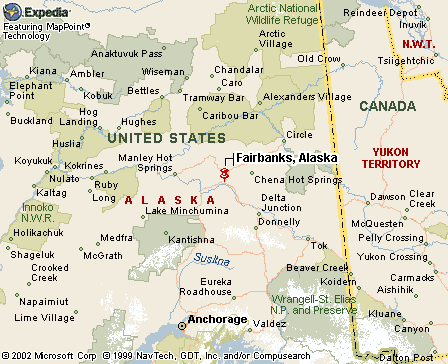|
|
Canku Ota |
|
|
(Many Paths) |
||
|
An Online Newsletter Celebrating Native America |
||
|
June 1, 2002 - Issue 62 |
||
|
|
||
|
Artist's Vision Woven Into Blanket |
||
|
by Diana Campbell Staff
Writer Fairbanks Daily News-Miner
|
||
|
|
|
But Manook, then 13, was too embarrassed to give the less-than-perfect carving to the woman. Today, three years after the popular West Valley High School Native arts teacher's unexpected death, his sister treasures the work. "He never showed it to her," said Karen Rifredi, Manook's oldest sister. The childish piece serves as a reminder of her beloved brother, who later went on to be nationally recognized for his expressive--and perfect--carvings. Manook was poised for further success as an artist when he died of a brain aneurysm at the age of 44 in 1999. He had long been recognized as a talented teacher, winning the Milken Award for Excellence and a $25,000 prize for teaching. Now the public has an opportunity to own Manook's art. On Thursday, the Doyon Foundation unveiled an aqua-hued woolen blanket that features an image of a salmon and mask sculpture by Manook. Part of the money collected in the sales of the blanket will go toward a scholarship endowment fund to help Doyon Ltd. shareholders and their descendants earn higher education degrees. Manook planned to help design the Doyon Foundation blanket before his death, said former foundation director Miranda Wright. His family finished the work, she said. Wright oversaw the project. The blanket is the fourth in a series called the "Spirit Keepers," representing "The Water People" because water has been an important part of Athabascan life, said Sharon Gillis, Doyon Foundation executive director. The blanket, manufactured by Pendleton Woolen Mills, will sell for $290 for a regular blanket and $315 for a numbered edition. The blanket is more expensive because it has more colors than the others, Gillis said. A series of multi-colored circles on the blanket represent salmon eggs. A border design represents trim that Manook's mother, Agnes Ostlund, sewed onto Manook's favorite Alaska-style jacket. Ostlund recalled how her son, affectionately call "Buster," would set her to work on different projects for him. She is a skilled seamstress and needlewoman. Once he asked her to knit him long woolen socks that would go over his knees to keep him warm while skiing, she said. "I don't know how, I told him,'" Ostlund said. "You could do anything, he said." The socks took her three days to knit, and when she finished she invited her son over for dinner and presented the socks. "I knew you could do it," he said, after trying the socks on. "Just a perfect fit." Fellow artist and good friend Alvin Amason remembered Manook's "goofiness" Thursday at the blanket's unveiling in the lobby of Doyon Ltd. Manook could find a humor in ravens and then recount the tales in an evening telephone call to friends. "He was someone you could enjoy the day with," he said. Amason fondly remembered the times the two would take trips to Kenai to subsistence fish and the long conversations on the drives between the Southcentral Alaska peninsula and Fairbanks. "What I would give," he said, and the rest of the words caught in his throat. Manook left a significant body of work, said Jean Flanagan-Carlo, the Alaska Native art liaison with the University of Alaska Fairbanks. The work has strong Athabascan influence, she said, pointing to ears on one mask featured in a slide show at the unveiling. "Where else would you hang beautiful beads from?" she said. Hundreds of high school students passed through Manook's classes at West Valley, and their work has clear Manook influence, Flanagan-Carlo said. The striking similarity astounds Rifredi, Manook's sister. One student showed her a carving after Manook's death. "I see my brother right in it," she said. "He was a great mentor." The other blankets in the "Spirit Keepers" series represent unity and peace, people of the land and people of the caribou. For more information about the blankets call 459-2040. |

|
www.expedia.com |
|
|
||
|
|
||
| Canku Ota is a free Newsletter celebrating Native America, its traditions and accomplishments . We do not provide subscriber or visitor names to anyone. Some articles presented in Canku Ota may contain copyright material. We have received appropriate permissions for republishing any articles. Material appearing here is distributed without profit or monetary gain to those who have expressed an interest. This is in accordance with Title 17 U.S.C. Section 107. | ||
|
Canku Ota is a copyright © 2000, 2001, 2002, 2003 of Vicki Lockard and Paul Barry. |
||
 |
 |
|
|
The "Canku Ota - A Newsletter Celebrating Native America" web site and its design is the |
||
|
Copyright © 1999, 2000, 2001, 2002, 2003 of Paul C. Barry. |
||
|
All Rights Reserved. |
||
 One
of the first carvings Ron Manook created was a replica of a young
woman he had a crush on. Taught to whittle as a pastime when the
family went camping, he worked the miniature figure out of cottonwood.
One
of the first carvings Ron Manook created was a replica of a young
woman he had a crush on. Taught to whittle as a pastime when the
family went camping, he worked the miniature figure out of cottonwood.